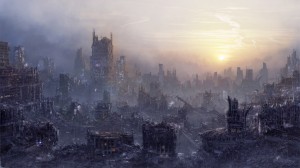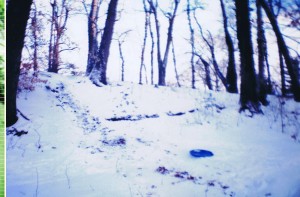 When I was a schoolboy, I used to plan for the world’s end. What would we need to survive? Where would we keep it? How would we defend it from the inevitable roving bands of marauders, who—if movies were any guide—would possess impressive organizational discipline, yet no ability to create anything but weapons?
When I was a schoolboy, I used to plan for the world’s end. What would we need to survive? Where would we keep it? How would we defend it from the inevitable roving bands of marauders, who—if movies were any guide—would possess impressive organizational discipline, yet no ability to create anything but weapons?
My side, which included my smart-but-bullied friends and me, would be prepared. We made lists. We drew pictures of supply depots. We diagrammed useful contraptions. The world would need rebuilding, and us to accomplish it.
Years later I read Isaac Asimov’s Foundation series, in which science affords predictions that aid civilization-builders. A planned future was possible because the smart people were in charge. When I was older still, I immersed myself in SimCity, designing cities from start to finish, crafting everything from the shapes of their waterways to the style of every home’s roof.
Knowledge is a means of seeing. As you acquire it in great quantities you are tempted to imagine, because you know more than most about important things (and you know they are important things, else why would someone as smart as you bother to know so much about them?), that you are a giant, rather than perhaps just a remarkably stout midget. From your privileged vantage point, you can see distant horizons.
I learned about The Long Now Foundation via Brain Pickings, a website that describes itself as a “cross-disciplinary LEGO treasure chest.” Aptly, this captures both the breadth of Brain Pickings offerings, and the constriction of its worldview. Both evidence a breathlessness over science and man which is captured by lopping off the disquieting portions in the opening to A Tale of Two Cities: we live in the best of times, an age of wisdom, a season of light…
The Long Now Foundation was established by futurists “to provide a counterpoint to today’s accelerating culture and help make long-term thinking more common.” One of the Foundation’s mitigations is the Manual for Civilization, envisioned as a 3000-volume collection spanning four categories: “cultural canon” (note the careful ellipsis of article), “mechanics of civilization,” “rigorous science fiction,” and “long-term thinking, futurism, and relevant history.” This last is defined as “Books on how to think about the future that may include surveys of the past.”
The past may be useful in service to the future, in other words, but what we need is not a remembrance of the past so much as a continual march into the coming centuries, our superior sensibilities as metal-halide lanterns piercing the darkness. A gimlet eye might perceive here the very shortened attention span its creators despise. Can anyone possess enduring wisdom who is besotted with his own age?
If you wanted to assemble books essential to civilization, what would you include?
The books in the Manual of Civilization thus far are what you can expect from the doyens of this age of light. A smattering of classics like Homer and Tolstoy. An overabundance of science fiction (and not even the best work). Popular scientism, broad-sweeping history surveys, predictions of man’s inevitable march into science—assisted immortality, faddish books on sociology and sexuality (my favorite is Love and Sex with Robots: no doubt an essential part of anyone’s civilizational kick-start toolkit).
One hopes the expanding panel of forward-peering librarians will eventually include a plumber (the grade at which a sewage pipe must be laid is no insignificant piece of cultural knowledge), and perhaps a dentist, and maybe even a farmer. The rarefied work of thought leaders is only sustained thanks to a base of civilizational mundanity broader than the first contributors to the Manual of Civilization seem to ascertain.
There is little in the spiritual dimension either, and the only way to make that worse would be by asking them to add spirituality.
Imagine with me the stereotype they would conjure from one of the American coasts in service to the task: a vegan with impeccable divinity school certifications and a warm but slightly condescending smile, brimming with quotes from the Bhagavad Gita and the Sermon on the Mount and Bob Dylan, full of spiritual-but-not-religious enthusiasm for abstract humanity and the idea of some anthropomorphized Creative Force with whom we might commune in an appropriately ecumenical and culture-spanning fashion, the kind of spiritual person who satisfies people who want to cover the theistic bases without getting dust on their shoes.
Better they not get it into their heads to include spirituality, for us and for them. The well-groomed ecumenicist makes for an excellent bouncer, but sometimes the bushy-browed man with the payot still worms his way into the prayer meeting, and with him the wound-kissing nun, the raspy-throated prophet, the true believers for whom civilization’s roots stretch well past Plato, and whose branches will continue to unfurl long after the cryogenically-frozen heads of utopian futurists are forgotten in their lockers.
Civilization in all its infuriating twists, its sweating, birthing masses who will not give over their rituals, who live joyfully in their varied ignorance, whose art cries out to heaven, whose brutalities stink to hell, who go to their singular deaths in terror or relief or anticipation—their persistence in dreaming God is perhaps civilization’s last best defense against intellectuals who would build polished towers to heaven.
Tony Woodlief lives outside Wichita, Kansas, and is the author of a spiritual memoir, Somewhere More Holy. His essays on faith and parenting have appeared in The Wall Street Journal, The London Times, and WORLD Magazine. His short stories, two of which have been nominated for Pushcart prizes, have been published in Image and Ruminate. His website is www.tonywoodlief.com.











